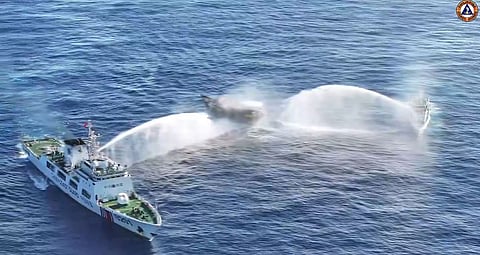
- NEWS
- the EDIT
- COMMENTARY
- BUSINESS
- LIFE
- SHOW
- ACTION
- GLOBAL GOALS
- SNAPS
- DYARYO TIRADA
- MORE

China has bared its terms in the West Philippine Sea, which it illegally claims as its territory, saying that it will allow one Philippine resupply boat to sail to Ayungin Shoal, implying that other vessels will be subject to attack.
A government source revealed that the China Coast Guard, or CCG, had told a resupply contingent that it is allowing a single vessel to reach the grounded BRP Sierra Madre, which is the country’s military outpost on the contested shoal in the West Philippine Sea.
China made known its stance in a radio challenge during a regular rotational and re-provisional mission for the Marine troops stationed on the Sierra Madre on 5 March.
A journalist aboard the Philippine vessel confirmed to Daily Tribune what China relayed to the boat’s crew.
The National Task Force on the WPS has yet to comment on the government’s response to the new tack.
During that particular mission, the Armed Forces of the Philippines deployed two chartered supply boats, the Unaizah May 1 or UM1 and Unaizah May 4 or UM4. The vessels were escorted by a PCG ship, the BRP Sindangan.
En route to the Sierra Madre, the Chinese vessels performed reckless blocking maneuvers against the supply boats and the PCG ship. The UM1 was carrying food supplies and other items for the troops while the empty UM4 was on a test mission.
In an earlier interview with local media, AFP Western Command chief Alberto Carlos, who was aboard the UM4, said the CCG vessels started shadowing them at 4 a.m. on Tuesday, while a helicopter that took off from a gray ship spent about an hour circling above the supply boat.
“It was an indication that they were very serious in monitoring the Unaizah May 4,” he said.
Aside from the CCG vessels, the AFP monitored at least 10 Chinese militia vessels in the area.
The UM1 successfully entered Ayungin Shoal but the other vessel was blocked and bombarded with high-pressure water cannons by two CCG ships. The water cannon attack damaged the glass windshields of UM4 and injured the navy crew on board.
The Philippines maintains its RoRe missions are legal and compliant with the United Nations Convention on the Law of the Sea, the 2016 Arbitral ruling and other international laws.
Speak up vs. China’s bullying
Following the CCG’s dangerous maneuvers against the Philippine vessels, PCG spokesperson for the WPS Commodore Jay Tarriela lambasted China for “twisting” the facts about the incidents in the WPS.
“If it weren’t for China’s bullying behavior, provocative actions, and illegal presence, there would be no chaos in the South China Sea. Your elaborate lies and detailed fake narratives will not cover up your ambitious intention of domination,” he said.
Tarriela stressed the need to voice out the country’s grievances against China’s bullying actions in the territorial waters. He said Filipinos must be vigilant against the spread of fake news and misinformation, “[especially] when it comes to the illegal and provocative actions of the People’s Republic of China in the West Philippine Sea.”
“Our love for our country should always be rooted in truth and not be swayed by falsehoods,” Tarriela posted in his X (formerly Twitter) account on Saturday.
Citing the increasing tension in the WPS, Tarriela stressed that “silence in the face of aggression is not an option” for the Philippines.
“To our government officials, it is important to speak up and take a stand against China’s bullying behavior towards our soldiers, sailors, and fishermen,” he said.
Tarriela emphasized the need to expose China’s unlawful actions against the Philippines that should be opposed.
“Let us remember that the patriotic Filipino people and the future generations of this country will hold us all accountable,” he said.
Xi orders preparations
China’s President Xi Jinping ordered its armed forces to prepare for military conflicts at sea, protect its maritime rights and interests, and develop its maritime economy.
Xi issued the directive during China’s annual parliament meeting with the delegation of the People’s Liberation Army and Armed Police Force on Thursday, amid the increasing tensions in the East and South China Seas.
In a television interview, Prof. Renato de Castro of the De La Salle University Department of International Studies, an international studies expert, said the Philippines should “expect and prepare for the worst” amid Xi’s order to China’s armed forces.
“China thinks they’re being put in a defensive position by decoupling, by the US-China strategic competition, and then, of course, by smaller countries like the Philippines and Vietnam challenging them in the maritime domain,” De Castro said.
Developing sea protection
Meanwhile, the Department of National Defense has bared its capability to respond and protect and secure the country’s territory and exclusive economic zone.
In a statement over the weekend, Defense Secretary Gilberto Teodoro Jr. said the DND and the AFP have implemented the Comprehensive Archipelagic Defense Concept or CADC.
“In plain language, we are developing our capability to protect and secure our entire territory and EEZ to ensure that our people and all the generations of Filipinos to come shall freely reap and enjoy the bounties of the natural resources that are rightfully ours within our domain,” Teodoro said.
The defense chief urged AFP commanders and units to utilize all efforts to enforce the CADC.
“I emphasize that this a strategic action and will not need constant directives to carry out. I thus urge our commanders and units in the AFP to exert all efforts to operationalize the CADC,” Teodoro said.
